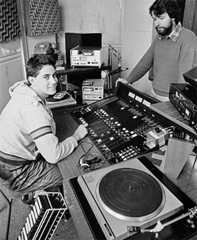Story: Māori radio – reo irirangi

In 2020 there were 21 Māori radio stations around New Zealand, revitalising the Māori language and continuing a tradition of Māori broadcasting that began in the 1920s.
Story by Piripi Walker
Main image: Te Ūpoko o te Ika Māori radio station, 1987
Story summary
Māori language on the radio before 1960
The first radio broadcasts in the Māori language were recordings of songs. On 6 February 1928, Waitangi Day, a programme of Māori history, songs and stories was broadcast across New Zealand. The first regular programme including Māori language was broadcast in 1928 and aimed to improve listeners’ pronunciation of Māori words.
The first programme entirely in Māori began in 1940. It was a news bulletin about the Second World War, and also included local Māori news. The newsreader, Wiremu (Bill) Parker, went on to have a 40-year career in broadcasting.
Other radio shows in the 1940s and 1950s includedNga pao me nga pakiwaitara a te Maori: song and story of the Maori, andTe reo o te Māori, which began in Napier, but was later broadcast nationally.
In 1964 Leo Fowler set up the New Zealand Broadcasting Corporation’s Māori Programmes Section. He and Bill Kerekere often took a mobile broadcasting studio around the country to record important Māori events.
Māori radio, 1960s to 1980s
Te puna waikōrero, made by the Māori Programmes Section, ran from 1971 to 1996. This long-running English-language programme reflected the interests of Māori.
Māori music was often heard on radio. Māori show bands were broadcast in the 1960s and the pop song ‘Poi e’ was a hit in the 1980s.
First iwi radio station
By the 1970s the number of fluent speakers of Māori had declined, as younger people were not learning the language. People began to argue that Māori should be spoken more widely, including on radio and television, as a way of reviving the language.
In 1978 Te Reo o Aotearoa, a new unit of Radio New Zealand (the national public radio broadcaster), was set up to make programmes in Māori and Pacific languages.
Temporary or part-time Māori radio stations began to broadcast in the 1980s. The first permanent Māori radio station, Te Reo Irirangi o Te Upoko o Te Ika, was set up in Wellington in 1987.
The iwi radio network
The first Māori radio stations had little funding and were often run by young people. In 1990 New Zealand on Air – Irirangi te Motu, the government agency that funds broadcasting, started fundingiwi radio stations. Te Māngai Pāho, a Māori broadcasting commission, was established in 1993. In 2020 there were 21iwi radio stations around the country.
How to cite this page
Piripi Walker, Māori radio – reo irirangi, Te Ara – the Encyclopedia of New Zealand, https://teara.govt.nz/en/maori-radio-reo-irirangi (accessed 27 October 2025).
Story by Piripi Walker, published 21 June 2017.




